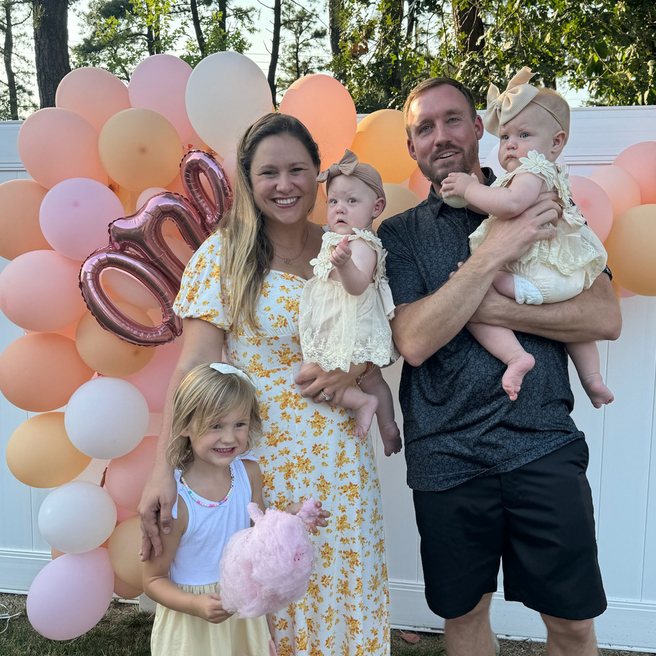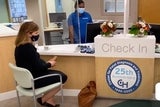Bridgette and Grace's Story: A Journey Through Twin-Twin Transfusion Syndrome
Bridgette and Grace's Story: A Journey Through Twin-Twin Transfusion Syndrome

Shortly after finding out they were expecting twins, Jackie and Trevor learned the girls had twin-twin transfusion syndrome, a life-threatening condition. They were referred to Children’s Hospital of Philadelphia (CHOP) and underwent a high-risk fetal surgery. Today, the twins, Bridgette and Grace, are healthy, thriving and full of energy, and the family remains deeply grateful for the care they received at CHOP.
In the spring of 2023, Jackie and Trevor got the surprise of their lives when they found out 10 weeks into pregnancy that they were expecting twins. They were still processing the news when an ultrasound at 12 weeks raised concerns. A follow-up ultrasound at 15 weeks confirmed their worst fear: the twins, Bridgette and Grace, were diagnosed with Stage 3 twin-twin transfusion syndrome (TTTS), a rare and life-threatening condition.
Jackie recalls the feeling of disbelief. “We had just found out we were having twins, and now we were hearing that one or both could be in danger.”
Referral to CHOP offers hope in a high-risk situation

With Stage 3 TTTS, time is crucial. Jackie and Trevor were referred to the Richard D. Wood Jr. Center for Fetal Diagnosis and Treatment (CFDT) at Children’s Hospital of Philadelphia (CHOP). The center specializes in TTTS care, having seen more than 2,522 referrals for that diagnosis since 1995.
Just three days after the diagnosis had been confirmed, the New Jersey couple drove an hour to CHOP, where they were introduced to Fetal Therapy Coordinator Jennifer DiBenedetto, BSN, RN. She walked them through what to expect from the full day of appointments.
At the end of the day, a team led by Maternal-Fetal Medicine Specialist Shelly Soni, MD, met with the couple and carefully explained the situation. In TTTS, there is an unequal exchange of blood between twins through blood vessel connections on the surface of the placenta. One twin (the donor) pumps blood to the other twin (the recipient). This causes the recipient twin to have too much blood and the donor twin to have too little.
Grace, the donor twin, was very small and lacked sufficient amniotic fluid, putting her survival at risk. Bridgette, the recipient twin, was at risk of developing hydrops, a serious form of heart failure.
Choosing fetal surgery for TTTS
Dr. Soni explained that while fetal surgery could save both twins, the outcome was uncertain. “The care team handled that conversation with as much empathy as possible,” recalls Jackie. “We had to make a decision no parent should ever have to make, and they helped us weigh our choices.”

It was a difficult decision, but Jackie and Trevor decided to move forward with fetal surgery, knowing it was their best chance to save both babies. It helped to know their care was in the best hands.
One week later, the CHOP team performed fetoscopic selective laser ablation. This is a minimally invasive surgery that disconnects the blood vessels between the twins to stop the dangerous blood flow imbalance.
The first thing Jackie remembers after the procedure is hearing Dr. Soni’s reassuring voice say, “Look at the screen, Jackie. That’s forward flow. That means it’s working.”
The next day, an ultrasound would determine whether the surgery had truly been successful. Jackie’s heart raced as she awaited the results. Even though it was Dr. Soni’s day off, she stayed in contact with the radiologist. When the results came in, Jackie breathed a sigh of relief: Both babies had survived, their hearts were strong, and Grace’s fluid levels had already increased.
A grateful goodbye and a new beginning

Though the surgery had been successful, the journey was far from over. The couple was sent home, but Jackie was placed on bedrest for the next four weeks to give the babies the best chance for survival. During that time, the couple traveled back and forth to CHOP for regular follow-up appointments. At the 20th week of pregnancy, their care was transitioned back to their local hospital in New Jersey.
Jackie’s final prenatal visit at CHOP was filled with emotions. “I was so overwhelmed,” she says of saying goodbye to the CHOP care team. “We wrote them long cards and tried our best to put into words how thankful we were.”
At 33 weeks and 3 days, Bridgette and Grace were born via C-section at the local hospital. Grace, the smaller of the two, required immediate medical attention and was intubated (required a breathing tube). Bridgette weighed 5 pounds 6 ounces, while Grace weighed 3 pounds 10 ounces. Both girls spent time in the NICU — Grace for 51 days and Bridgette for 31. Grace faced some setbacks in her recovery and needed a blood transfusion to boost her progress, but over time, both girls began to grow stronger.
Though they faced health risks during their time in the womb and shortly after birth, Bridgette and Grace are now healthy, ahead of developmental milestones, and full of energy at 18 months old. Grace is fearless and always on the move, while Bridgette is more laid-back and reserved. Despite their differences, they complement each other perfectly.
“It’s unbelievable,” says Jackie, her voice filled with emotion. “It’s hard to wrap our heads around the fact that they’re here, let alone that they’re healthy and thriving.”
Jackie and Trevor remain deeply grateful for the care they received at CHOP. They continue to stay in touch with Dr. Soni and the care team and look forward to seeing them every year at CHOP’s annual Lori J. Howell Fetal Family Reunion at the Philadelphia Zoo.

Tour our Fetal Center
The Wood Center for Fetal Diagnosis and Treatment has cared for many families and will help you through your journey, too.

Patient Success Story
Tiny Miracles
When their twins were diagnosed prenatally with TTTS, a New Jersey couple found hope at Children’s Hospital of Philadelphia.